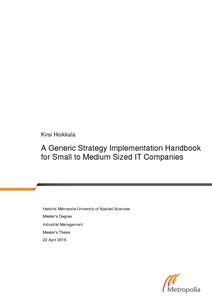A Generic Strategy Implementation Handbook for Small to Medium Sized IT Companies
Hoikkala, Kirsi (2018)
Hoikkala, Kirsi
Metropolia Ammattikorkeakoulu
2018
All rights reserved
Julkaisun pysyvä osoite on
https://urn.fi/URN:NBN:fi:amk-201805188932
https://urn.fi/URN:NBN:fi:amk-201805188932
Tiivistelmä
Many small and mediums sized IT companies employ young and innovative millennials, who are not satisfied with conventional management methods. In addition to focusing their attention on developing sophisticated solutions, young employees want to have an impact on the company. Studies reveal that nine out of ten employees do not understand company’s strategy. This applies to all companies, also to those, where management methods are somewhat conventional. This study investigated how to successfully run strategy implementation work, in the demanding competitive environment, with modern management methods. The objective of this Thesis was to develop a generic Strategy implementation handbook, which guides companies in practice through strategy implementation successfully within modern SME IT companies.
The approach to conducting the research in this Thesis was case research combined with qualitative research. Data was gathered with interviews, and results of previous strategy study was utilized. The study was conducted by first analyzing best practice at two example companies, which guided to the relevant existing knowledge and best practice. The initial version of the Strategy implementation handbook was validated and moderated in interviews with the same interviewees as on previous data rounds in addition also a specialist interview was conducted.
The final version of the Strategy implementation handbook consists of 6 steps: 1) Summarizing strategic intent, 2) Testing the feasibility of strategy, 3) Practical interpretation of strategic themes, 4) Establishing action plans, 5) Measuring performance, and finally 6) Adapting to rapid pace of change. Briefly, the Strategy implementation handbook helps SME IT companies to utilize the enormous internal power that the committed employees entail. The Handbook assists companies to adapt to the fierce competition, where decisions are made fast, and winners attract the most talented, passionate and creative work force.
The most essential findings of the Handbook are to understand that the way people work is changing, which leads to considerable changes in the company culture. The stiff, conventional top-down management is turned upside-down, to bottom-up management, where decisions are made fast and where the real-life experts have the power to make decisions, and where cooperation is valued. In this new world, the leaders’ serve employees and assist them to shine. The management ideas this Thesis contain, are not widely spread yet, these ideas will eventually conquer the world.
The approach to conducting the research in this Thesis was case research combined with qualitative research. Data was gathered with interviews, and results of previous strategy study was utilized. The study was conducted by first analyzing best practice at two example companies, which guided to the relevant existing knowledge and best practice. The initial version of the Strategy implementation handbook was validated and moderated in interviews with the same interviewees as on previous data rounds in addition also a specialist interview was conducted.
The final version of the Strategy implementation handbook consists of 6 steps: 1) Summarizing strategic intent, 2) Testing the feasibility of strategy, 3) Practical interpretation of strategic themes, 4) Establishing action plans, 5) Measuring performance, and finally 6) Adapting to rapid pace of change. Briefly, the Strategy implementation handbook helps SME IT companies to utilize the enormous internal power that the committed employees entail. The Handbook assists companies to adapt to the fierce competition, where decisions are made fast, and winners attract the most talented, passionate and creative work force.
The most essential findings of the Handbook are to understand that the way people work is changing, which leads to considerable changes in the company culture. The stiff, conventional top-down management is turned upside-down, to bottom-up management, where decisions are made fast and where the real-life experts have the power to make decisions, and where cooperation is valued. In this new world, the leaders’ serve employees and assist them to shine. The management ideas this Thesis contain, are not widely spread yet, these ideas will eventually conquer the world.
